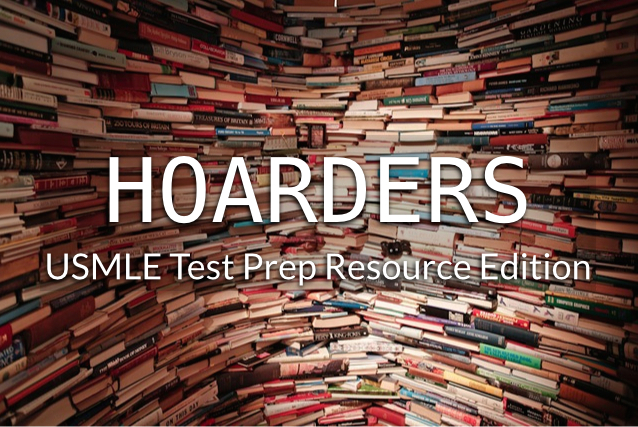Are you a USMLE Test Prep Resource Hoarder?
- by
- Mar 02, 2020
- Reviewed by: Amy Rontal, MD

We do it because we want to excel. We do it because we see others doing it. What is it that we do? We accumulate resources!
It’s not unusual to walk into the bedroom of a first or second year medical student and see tons of textbooks, study manuals, review books, notes, flashcards, etc. strewn about. It’s enough to make anyone pull their hair out from stress and uncertainty about where to turn next. How did we ever get into this mess?
Why do we hoard resources?
1. We feel like it is the right thing to do.
We see upperclassmen using these books, and we trust their judgment. We visit Amazon.com or Barnes&Noble.com and see FIVE star reviews for classic medical tomes, and we feel that we would be impossibly disadvantaged without these texts sitting on our bookshelves.
2. It is easy to acquire books.
Just click on that Amazon.prime link, and within 1-2 days, a new book will be sitting on your doorstep (or flown in by drone if you hail from the future). Or hand over $10 in cash to that eager 3rd year student, and presto: you have another book to collect dust.
3. Buying a book creates an unconscious payoff.
It makes us feel like we’ve done something to further our education, even though we really haven’t. Ironically, buying a medical textbook can hurt our chances of learning because it removes the urgency of learning. We may feel, “I’ve already done something positive (=purchase the book). I will do the rest later (=read the book).” Not good!
4. We are risk averse.
From our choice of careers to our outlooks on life, many of us are averse to risk. We are also highly conscious of what our peers are thinking and doing. We are constantly afraid of falling behind, of missing that key pathophysiology detail that everyone else knows. It makes sense to therefore acquire resources that contain ALL of the information, and that everyone else is using.
Luckily, there is a better way. At MST, we strongly believe in alternative approaches to acquiring, synthesizing, and retaining medical information. Trying to learn a difficult topic for the first time from a reference book is not an approach we recommend. True, there are individuals who can read a lengthy textbook chapter and seemingly retain the important information, but that’s likely not how YOU learn—and it’s not how WE learn either.
The best (and really only time) to sit down with a reference chapter is after already knowing 70-80% of the content. Why? Because only then will we be able to extract the details we need to plug the gaps in our knowledge. Even then, it is likely not a great use of time to read a dense textbook chapter. There is just too much information to process and remember.
As medical students and trainees, we need to come to terms with the following realization: We are going to forget most of what we read. There is no way around it! However, once we accept this unfortunate reality of medical education, we can focus our energies on learning medical information in a way that will promote long-term retention.
How can this be accomplished? How can we hard-wire the content into our brains to easily access it in pressurized situations, such as on standardized exams and clinical rounds? The most important thing is to prioritize active learning methods such as flashcards and practice questions (hello, UWorld, AMBOSS and other Qbanks!). Avoid passive learning approaches like video lectures where things tend to just go in one ear and out the other.
Push yourself to get uncomfortable by tackling your areas of weakness. And if you’re struggling or you’ve plateaued in your score, don’t hesitate to reach out for help. Talk to your support faculty at school to see if you have access to peer tutors or other assistance. Seek out advice from those who have been successful in conquering the material you’re struggling with. Or get in touch with us to work 1:1 with a tutor to ensure you master the material and secure that strong foundation of knowledge!
Whatever you do, believe in yourself, resist the FOMO resource urge, and take it (literally — heh!) one step at a time.









